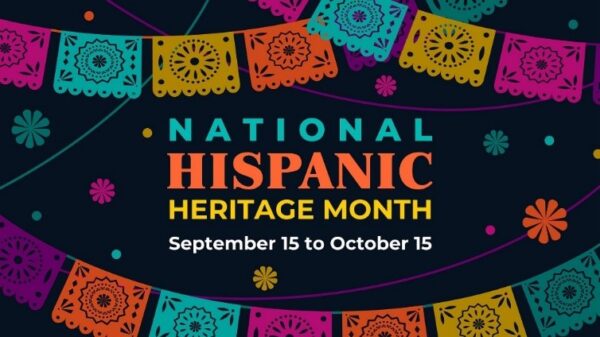The DEI Committee would like everyone to join in as we celebrate and learn about holidays and movements taking place this month.

Hispanic Heritage Month is an annual celebration of the history and culture of the U.S. Latinx and Hispanic communities. The event, which spans from September 15 to October 15, commemorates how those communities have influenced and contributed to American society at large.
The term Hispanic or Latino (or the more recent term Latinx) refers to a person’s culture or origin—regardless of race. On the 2020 Census form, people were counted as Hispanic or Latino or Spanish if they could identify as having Mexican, Mexican American, Chicano, Puerto Rican, Cuban, or “another Hispanic, Latino, or Spanish origin.”
Hispanic Heritage Month began as a commemorative week when it was first introduced in June of 1968 by California Congressman George E. Brown. The push to recognize the contributions of the Latinx community had gained momentum throughout the 1960s when the civil rights movement was at its peak and there was a growing awareness of the United States’ multicultural identities.
On September 17, 1968, Congress passed Public Law 90-48, officially authorizing, and requesting the president to issue annual proclamations declaring September 15 and 16 to mark the beginning of National Hispanic Heritage Week and called upon the “people of the United States, especially the educational community, to observe the week with appropriate ceremonies and activities.” President Lyndon B. Johnson issued the first Hispanic Heritage Week presidential proclamation the same day.
Why the Date of Hispanic Heritage Month Is Important:
The timing of Hispanic Heritage Month coincides with the Independence Day celebrations of several Latin American nations. September 15 was chosen as the kickoff because it coincides with the Independence Day celebrations of five “Central American neighbors,” as Johnson called them—Costa Rica, El Salvador, Guatemala, Honduras, and Nicaragua. Those five nations declared their independence from Spain on September 15, 1821.
In his proclamation, Johnson also acknowledged Mexico, which declared its independence from Spain on September 16, 1810. Although not mentioned specifically by Johnson, Chile also celebrates its independence during that week (September 18, 1810, from Spain) and Belize, which declared its independence from Great Britain on September 21, 1981, was subsequently added to the list of nations specifically celebrated during what is now Hispanic Heritage Month.
Hispanic Heritage Month 2022 will last from Thursday, September 15, 2022, through Saturday, October 15, 2022.
Sources
National Hispanic Heritage Month
Hispanic Heritage Month, United States Census Bureau
The Creation and Evolution of the National Hispanic Heritage Celebration, United States House of Representatives
National Hispanic Heritage Month, Library of Congress
National Hispanic Heritage Month, 1989, The America Presidency Project
National Hispanic Heritage Week bill signed, Sep. 17, 1968, Politic

Rosh Hashanah 2022 will begin in the evening of Sunday, September 25 and ends in the evening of Tuesday, September 27.
Rosh Hashanah, the Jewish New Year, is one of Judaism’s holiest days. Meaning “head of the year” or “first of the year,” the festival begins on the first day of Tishrei, the seventh month of the Hebrew calendar, which falls during September or October. Rosh Hashanah commemorates the creation of the world and marks the beginning of the Days of Awe, a 10-day period of introspection and repentance that culminates in the Yom Kippur holiday, also known as the Day of Atonement. Rosh Hashanah and Yom Kippur are the two “High Holy Days” in the Jewish religion.
Apples and honey are almost synonymous with Rosh Hashanah. It’s traditional to dip apples in honey to symbolize the hope for a sweet year ahead.
The pomegranate, a “new fruit” (fruits that have not been eaten in a long time), are typically eaten on Rosh Hashanah. Pomegranates are also (apocryphally) said to have exactly 613 seeds, connecting it to the 613 commandments of the Torah.

Ganesh Chaturthi – August 22 – September 20
Ganesh Chaturthi, also known as Vinayaka Chaturthi, or Vinayaka Chaviti is a Hindu festival celebrating the arrival of Lord Ganesh to earth from Kailash Parvat with his mother Goddess Parvati/Gauri. The festival is marked with the installation of Lord Ganesh’s clay murtis privately in homes and publicly on elaborate pandals (temporary stages). Observations include chanting of Vedic hymns and Hindu texts such as, prayers and vrata (fasting). Offerings and prasāda from the daily prayers, that are distributed from the pandal to the community, include sweets such as modaka as it is believed to be a favourite of Lord Ganesh. The festival ends on the tenth day after start, when the idol is carried in a public procession with music and group chanting, then immersed in a nearby body of water such as a river or sea, called visarjan. In Mumbai alone, around 150,000 statues are immersed annually. Thereafter the clay idol dissolves and Ganesh is believed to return to Mount Kailash to Parvati and Shiva.
The festival celebrates Lord Ganesh as the God of New Beginnings and the Remover of Obstacles as well as the god of wisdom and intelligence and is observed throughout India, especially in the states such as Maharashtra and Goa. Ganesh Chaturthi is also observed in Nepal and by the Hindu diaspora elsewhere such as in Australia, New Zealand, Canada, Singapore, Malaysia, Trinidad and Tobago, Guyana, Suriname, other parts of the Caribbean, Fiji, Mauritius, South Africa, United States, and Europe. In the Gregorian calendar, Ganesh Chaturthi falls between 22 August and 20 September every year.

HeForShe is a social movement campaign created by the UN to promote gender equality. It’s targeted at men to become the agents of change for women’s rights. Below are some ways you can be a better ally for gender equality.
- Actively listen to women and their perspectives
- Reflect on your own power and privilege as a man
- Credit your female coworkers’ ideas fairly
- Advocate for gender-equitable policies in the workplace
- Challenge sexism and speak up when you hear sexist language used
- Take on your full share of the housework and childcare at home